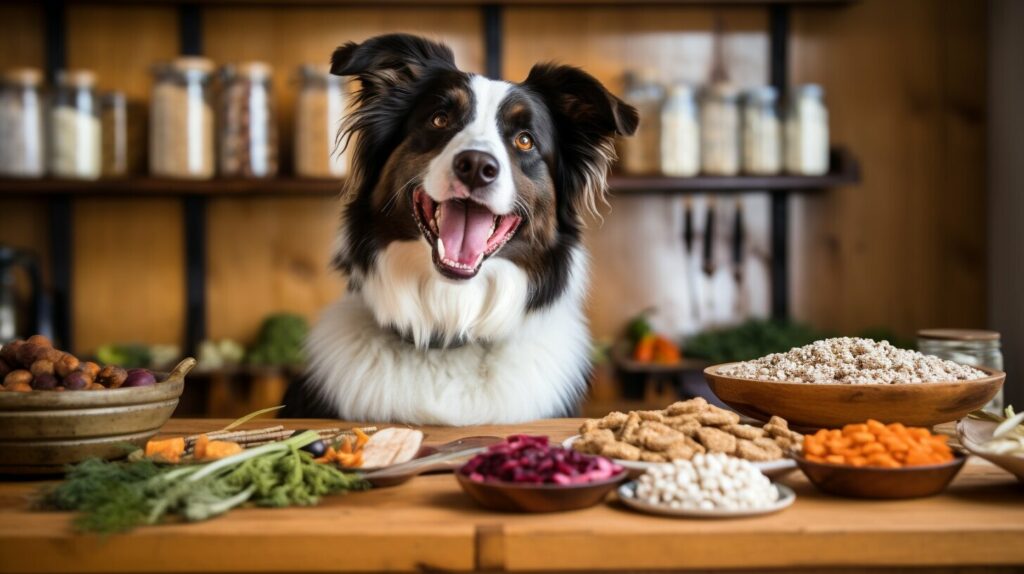As a dog owner, you want your furry friend to live their best life possible. One of the essential factors in achieving this is by providing your dog with the best foods for optimum health. A balanced diet goes a long way in ensuring your dog remains healthy, active, and happy.
When selecting food for your dog, there are various factors to consider, such as nutrition, taste, and affordability. Fortunately, there are numerous dog food brands that offer high-quality and nutritious options that fit every budget.
In this article, we will explore the best foods for dogs, healthy dog food options, and dog food brands that will help keep your pup healthy and happy.
Key Takeaways
- Feeding your dog a balanced diet is crucial for their overall well-being
- There are numerous high-quality dog food brands that provide nutritious options
- Selecting dog-friendly ingredients, understanding dog food labels, and considering a dog’s age and breed are essential factors to consider when selecting dog food
- Homemade dog food recipes can be an excellent way to provide nutritional variety for your pup
Importance of a Balanced Diet for Dogs
A balanced diet is crucial for your dog’s overall health and well-being. Proper nutrition can help prevent diseases and aid in maintaining their ideal weight. Just like humans, dogs require a balanced diet to ensure they get the necessary nutrients for optimal health.
Essential nutrients that your dog requires include protein, fats, carbohydrates, vitamins, and minerals. A balanced diet provides your dog with the right amount of each of these nutrients, which keeps them healthy and active.
Protein is essential for building and repairing your dog’s muscles, organs, and tissues. Fats provide energy, insulation, and support to the immune system. Carbohydrates provide energy and fiber necessary for maintaining a healthy digestive system. Vitamins and minerals are essential for the proper function of your dog’s body systems; these include calcium for healthy bones, iron for red blood cell production, and vitamins A, C, and E to support their immune system.
Feeding your dog a balanced diet that includes all of these nutrients is vital to keep them healthy. Depending on your dog’s breed, age, size, and activity level, their nutritional requirements may vary. It’s important to consult with your veterinarian for recommendations on the right types and amount of food to feed your dog.
High-Quality Dog Food Brands
If you’re looking for high-quality dog food brands that offer the best nutrition for your furry friend, there are several factors to consider. When selecting a brand, look for dog food that contains high-quality ingredients, including real animal protein sources, whole grains, vegetables, and fruits. Avoid brands that contain artificial preservatives, colors, or flavors, as well as those that use low-quality fillers, such as soy or corn.
One of the most important things to consider when selecting a dog food brand is the nutritional adequacy statement. This statement indicates that the dog food meets the nutrient levels established by the Association of American Feed Control Officials (AAFCO) for a specific life stage, such as puppies, adults, or senior dogs. Some of the best dog food brands that meet AAFCO standards include Blue Buffalo, Orijen, and Taste of the Wild.
Another factor to consider when selecting a dog food brand is the type of meat used as the primary protein source. Look for brands that use high-quality animal protein sources, such as chicken, beef, lamb, or fish. Avoid brands that use by-products or meat meals, as these are lower quality and less nutritious.
Ultimately, the best dog food brand for your pet will depend on their individual needs and preferences. Consulting with your veterinarian can help you make an informed decision on what to feed your pet. Remember, investing in a high-quality dog food brand is an investment in your pet’s long-term health and well-being.
Understanding Dog-Friendly Ingredients
When it comes to selecting the best food for your dog, it’s essential to choose dog-friendly ingredients. These are ingredients that are easily digestible and provide the essential nutrients that your dog needs to thrive. Natural dog food often contains these ingredients, making it a popular choice among pet owners.
So, why should you choose natural dog food with dog-friendly ingredients? First and foremost, natural dog food contains no artificial preservatives, additives, or fillers that may harm your dog’s health. Instead, these foods contain simple, wholesome ingredients that provide the necessary nutrition for your furry friend.
Some examples of dog-friendly ingredients include lean meats, such as chicken or turkey, whole grains, like brown rice, and vegetables, such as sweet potatoes and peas. These ingredients provide the necessary protein, carbohydrates, and fiber that your dog needs for optimal health.
Additionally, natural dog food often contains antioxidants, vitamins, and minerals that support your dog’s immune system and overall well-being. As such, incorporating natural dog food with dog-friendly ingredients into your dog’s diet can help prevent health issues such as obesity, heart disease, and joint problems.
Overall, choosing natural dog food with dog-friendly ingredients is a wise choice for pet owners who prioritize their dog’s health and well-being. By selecting high-quality, nutritious dog food, you’re ensuring that your furry friend receives the optimal nutrition they need to live a healthy and happy life.
Grain-Free Dog Food: Is It Right for Your Dog?
Grain-free dog food has become a popular choice among pet owners in recent years. While it’s true that some dogs may benefit from a grain-free diet, it’s important to understand whether this type of food is right for your dog before making the switch.
One potential benefit of grain-free dog food is that it may be easier for dogs with certain food sensitivities to digest. If your dog has a grain allergy or intolerance, switching to a grain-free diet may help alleviate symptoms such as vomiting or diarrhea.
However, not all dogs require a grain-free diet, and it’s important to remember that grain-free does not necessarily mean healthier. Some grain-free dog food brands may replace grains with other ingredients that are still not ideal for dogs, such as high levels of potatoes or legumes.
When considering grain-free dog food brands, it’s crucial to do your research and choose a high-quality brand that uses appropriate ingredients. Look for brands that use real, whole-food ingredients and avoid fillers and artificial preservatives.
It’s also essential to consult with your veterinarian before making any major changes to your dog’s diet. They can provide guidance on whether a grain-free diet is appropriate for your specific dog based on their breed, age, and overall health.
Some recommended grain-free dog food brands include Orijen, Merrick, and Taste of the Wild. Remember to always check the ingredients and choose a brand that suits your dog’s nutritional needs.
Considering Organic Dog Food for Your Pet
If you are looking for healthy and nutritious food for your furry friend, organic dog food may be worth considering. This type of food is made using high-quality ingredients that are free from harmful chemicals and additives.
Organic dog food brands are becoming increasingly popular, and for a good reason. They offer a range of benefits, including:
- Healthier ingredients: Organic dog food is made using natural, whole-food ingredients that are free from artificial colors, flavors, and preservatives. This means that your dog is getting a healthier diet that is packed with essential nutrients.
- Better for the environment: Organic dog food is produced using sustainable farming practices that are designed to protect the environment. This means that you are doing your part to reduce your pet’s carbon footprint.
- No GMOs: Organic dog food brands do not use genetically modified organisms (GMOs) in their products. This means that your dog is not exposed to potentially harmful chemicals and additives that can be found in conventional dog food.
When selecting organic dog food brands, make sure to look for products that are certified by reputable organizations such as the USDA. This will ensure that you are getting a high-quality product that meets strict standards.
| Organic Dog Food Brands | Description |
|---|---|
| Organix | Organix offers a range of organic dog food options that are made using high-quality ingredients. |
| Castor & Pollux | Castor & Pollux offers a range of organic dog food options that are made using organic, grass-fed beef and other natural ingredients. |
| Blue Buffalo | Blue Buffalo offers a range of organic dog food options that are formulated to meet the nutritional needs of dogs of all ages and sizes. |
Overall, choosing organic dog food for your pet is a great way to provide them with a healthy, nutritious diet that is free from harmful chemicals and additives. Consider giving it a try and see the difference it can make in your dog’s overall health and well-being.
Homemade Dog Food Recipes for Nutritional Variety
Are you looking to provide your dog with some variety in their diet? Homemade dog food may be the solution you’re looking for. By preparing meals at home, you can ensure that your furry friend is getting a nutritious and balanced diet. Here are some easy recipes to get you started:
Recipe 1: Chicken and Rice
| Ingredients | Instructions |
|---|---|
|
|
This recipe is easy to make and provides your dog with protein, fiber, and essential vitamins and minerals.
Recipe 2: Beef and Sweet Potato
| Ingredients | Instructions |
|---|---|
|
|
This recipe is rich in protein and vitamins while also being flavorful and easy to digest.
Remember, when making homemade dog food, it’s important to maintain a balanced diet. Consult with your veterinarian or a veterinary nutritionist to ensure you’re providing your dog with all the essential nutrients they need. Additionally, avoid using ingredients that are toxic to dogs, such as garlic, onions, and chocolate.
Understanding Dog Food Labels: Decoding the Terminology
When shopping for dog food, understanding the terminology used on labels can be overwhelming. Knowing how to read the ingredients list and nutritional information is crucial for selecting the best foods for your furry friend’s health. Here are some key terms to look out for:
| Term | Meaning |
|---|---|
| Animal by-products | Parts of animals that are not meat, such as organs or bones. Quality can vary widely. |
| Meat by-products | Similar to animal by-products, but specifically refers to non-muscle tissue from slaughtered animals. |
| Meal | Meat or fish that has had the water removed, resulting in a concentrated form of protein. |
| Grain-free | Dog food that doesn’t contain any grains, such as wheat or corn. Can be beneficial for dogs with allergies or sensitivities. |
| Organic | Food that is produced without the use of synthetic fertilizers, pesticides, or other harmful chemicals. |
It’s also important to pay attention to the order of the ingredients. The first ingredient listed should be a high-quality protein source, such as beef, chicken, or fish. Avoid dog food brands with fillers like corn or soy. Look for food that has a balanced ratio of protein, fat, and carbohydrates to ensure your dog is getting the proper nutrition for their health.
Remember, just because a label says “natural” or “healthy” doesn’t mean it’s the best option for your dog. Always read the ingredients list and nutritional information to make an informed decision.
The Role of Age and Breed in Dog Nutrition
When it comes to feeding your furry friend, age and breed play a crucial role in their nutritional needs. Every dog has different dietary requirements, and it’s essential to understand them to provide a balanced diet for optimal health.
Dietary Needs of Puppies
Puppies require a higher calorie and protein intake than adult dogs to support their growth and development. Ensure that your puppy’s food includes essential nutrients, such as calcium and phosphorus, for healthy bone formation. Feeding them small, frequent meals is also crucial to maintain their energy levels.
Dietary Needs of Adult Dogs
Adult dogs require a well-balanced diet that includes protein, fiber, carbohydrates, vitamins, and minerals. Depending on their breed, size, and activity level, the amount of food they need may vary. It’s crucial to monitor their weight and adjust their diet accordingly to prevent obesity and other health problems.
Dietary Needs of Senior Dogs
Senior dogs have different nutritional needs that may vary depending on their age and breed. They may require fewer calories and more protein to maintain muscle mass and prevent weight gain. It’s advisable to provide them with food that is easier to digest, such as those that contain senior-supportive nutrients like joint supplements and antioxidants.
Dietary Needs of Different Breeds
Dogs of different breeds may have specific dietary requirements. For example, larger breeds like Great Danes and Mastiffs require a diet that contains more protein and fewer calories to prevent joint problems. On the other hand, smaller breeds like Chihuahuas may require more frequent meals to maintain their energy levels.
Understanding your dog’s nutritional needs is crucial for their overall well-being. Consult with your veterinarian to create a diet that is tailored to your dog’s age, breed, and individual requirements. Providing a balanced diet for your furry friend can help ensure a long, healthy life.
Conclusion
Choosing the best foods for your dog is essential for their optimal health and well-being. As you’ve learned, providing a balanced diet with high-quality ingredients is crucial.
When selecting dog food brands, always consider those with healthy options that cater to your dog’s needs, such as grain-free or organic dog food. Take the time to read and decode the labels to ensure that you’re making informed choices.
Remember that your dog’s age and breed will also play a crucial role in determining their nutritional needs. Be mindful of providing adequate nutrition for puppies, adult dogs, and senior dogs.
Creating homemade dog food is also an option to provide your pet with nutritional variety. Just be sure to follow recipes that provide a balanced diet.
In conclusion, selecting the best foods for dogs is essential for their health and well-being. Make sure to prioritize your dog’s nutrition and provide them with the healthy dog food they deserve.
FAQ
Q: What are the best foods for dogs?
A: The best foods for dogs are those that provide a balanced diet and meet their nutritional needs. Look for high-quality dog food brands that use healthy ingredients and avoid artificial additives.
Q: Why is a balanced diet important for dogs?
A: A balanced diet is important for dogs because it ensures they receive all the necessary nutrients for optimal health. It helps maintain a healthy weight, supports their immune system, and promotes overall well-being.
Q: Which dog food brands are considered high-quality?
A: Some high-quality dog food brands include Blue Buffalo, Royal Canin, and Hill’s Science Diet. These brands prioritize the use of wholesome ingredients and offer a range of options for different dietary needs.
Q: What are dog-friendly ingredients?
A: Dog-friendly ingredients are those that are safe and beneficial for dogs to consume. Natural ingredients, such as lean meats, fruits, and vegetables, are often considered dog-friendly as they provide essential nutrients without artificial additives.
Q: Is grain-free dog food suitable for all dogs?
A: Grain-free dog food may be suitable for some dogs, especially those with specific dietary sensitivities or allergies. However, it is important to consult with a veterinarian before switching your dog to a grain-free diet.
Q: What are the benefits of organic dog food?
A: Organic dog food offers several benefits, including the use of organic ingredients grown without synthetic pesticides or fertilizers. It provides a natural and wholesome option for pet owners who prioritize sustainable and ethical food choices.
Q: Can I prepare homemade dog food for my pet?
A: Yes, you can prepare homemade dog food to provide nutritional variety. It is important to follow balanced recipes that include all the necessary nutrients for your dog’s specific needs. Consult with a veterinarian for guidance.
Q: How can I understand dog food labels?
A: Understanding dog food labels can be challenging. Look for terms like “complete and balanced,” which indicate that the food meets specific nutritional standards. Avoid ingredients like artificial preservatives, colors, and fillers.
Q: Are there specific dietary considerations for different dog ages and breeds?
A: Yes, a dog’s age and breed can impact their nutritional needs. Puppies require a diet rich in nutrients for growth, while adult dogs need a balanced maintenance diet. Senior dogs may benefit from foods tailored to their aging bodies.



